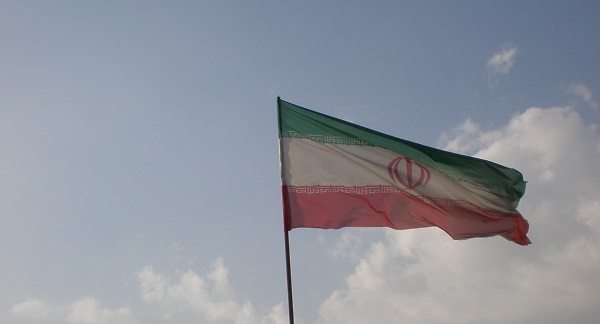Daily Caller
World’s Largest State Sponsor Of Terrorism Sets Sights On New Goal: Become A Vacation Destination

From the Daily Caller News Foundation
By Jake Smith
The world’s largest state sponsor of terrorism, Iran, is setting its sights on a new goal: to become a first-rate resort and tourism destination.
Iran is sanctioned by vast swaths of the international community for its support and funding of various terrorist networks in the Middle East that have killed a number of U.S. forces in recent years. Though the Islamic regime is infamous for imposing an iron rule against the Iranian people and has one of the world’s worst economies, Tehran is hoping to break into the vacation game and bring in millions of tourists per year, according to reports.
“Tourism is the greatest asset for Iran’s cultural diplomacy,” Iranian Minister of Cultural Heritage, Tourism and Handicrafts Seyyed Reza Salehi-Amiri said at an event Tuesday. “Cultural diplomacy fosters relations between nations, shared understanding, and collective peace and stability.”
“We must recognize that cultural heritage and tourism should become one of the country’s top three priorities. By promoting cultural diplomacy, we can aim for a future where tourism replaces the oil revenues as a primary economic driver,” Salehi-Amiri said.
Salehi-Amiri explained that the goal is to attract 15 million tourists to Iran by 2028. He also went on to say that Iran should build hundreds of new hotels by that year.
What our armed forces did was to inflict the minimum punishment on that usurping Zionist regime in response to its appalling crimes. It’s a bloodthirsty regime, a wolf-like regime, and the US’s rabid dog in the region.
— Khamenei.ir (@khamenei_ir) October 6, 2024
Iran enjoyed a 21% increase in tourism in 2023, according to the Tehran Times.
“Cultural heritage is Iran’s soft power. Just as we need hard power for deterrence, we need soft power to showcase our cultural and civilizational capacities to the world,” Salehi-Amiri said on Tuesday.
His comments leave many open questions in place, such as how practical it is to build hundreds of new hotels in such a short time frame, as Iran’s annual gross domestic product (GDP) is only a fraction of other Arab states in the region, such as Saudi Arabia the United Arab Emirates. Iran’s economy is considered “repressed,” given rampant corruption in the government, weak rule of law and a lack of robust trade relations with virtually any Western nation, according to The Heritage Foundation’s Index of Economic Freedom.
There are also questions as to how the theoretical tourists would be treated, given Iran’s incredible hostility toward the West and scores of reports of human rights abuses, particularly against women. Because of corruption at even the highest ends of Iran’s government and law enforcement structure, these abuses often go unpunished.
The regime in Iran also sends a considerable amount of money to its various terrorist groups in the Middle East, including Hamas, Hezbollah and the Houthis. Iran’s chief export — oil — brings in money for the regime to send to its actors in the region.
Iranian oil revenues fell sharply under the former Trump administration’s “maximum pressure” sanctions campaign against Iran. However, in recent years under the Biden-Harris administration’s foreign policy and eased sanctions, Iran has made tens of billions in additional revenues.
Daily Caller
AI Needs Natural Gas To Survive


From the Daily Caller News Foundation
By David Blackmon
As recent studies project a big rise in power generation demand from the big datacenters that are proliferating around the United States, the big question continues to focus in on what forms of generation will rise to meet the new demand. Most datacenters have plans to initially interconnect into local power grids, but the sheer magnitude of their energy needs threatens to outstrip the ability of grid managers to expand supply fast enough.
This hunger for more affordable, 24/7 baseload capacity is leading to a variety of proposed solutions, including President Donald Trump’s new executive orders focused on reviving the nation’s coal industry, scheduled to be signed Tuesday afternoon. But efforts to restart the permitting of new coal-fired power plants in the US will require additional policy changes, efforts which will take time and could ultimately fail. In the meantime, datacenter developers find themselves having to delay construction and completion dates until firm power supply can be secured.
Datacenters specific to AI technology require ever-increasing power loads. For instance, a single AI query can consume nearly ten times the power of a traditional internet search, and projections suggest that U.S. data center electricity consumption could double or even triple by 2030, rising from about 4-5% of total U.S. electricity today to as much as 9-12%. Globally, data centers could see usage climb from around 536 terawatt-hours (TWh) in 2025 to over 1,000 TWh by 2030. In January, a report from the American Security Project estimated that datacenters could consume about 12% of all U.S. power supply.
Obviously, the situation calls for innovative solutions. A pair of big players in the natural gas industry, Liberty Energy and Range Resources, announced on April 8 plans to diversify into the power generation business with the development of a major new natural gas power plant to be located in the Pittsburgh area. Partnering with Imperial Land Corporation (ILC), Liberty and Range will locate the major power generation plant in the Fort Cherry Development District, a Class A industrial park being developed by ILC.
“The strategic collaboration between Liberty, ILC, and Range will focus on a dedicated power generation facility tailored to meet the energy demands of data centers, industrial facilities, and other high-energy-use businesses in Pennsylvania,” the companies said in a joint release.
Plans for this new natural gas power project follows closely on the heels of the March 22 announcement for plans to transform the largest coal-fired power plant in Pennsylvania, the Homer City generating station, into a new gas-fired facility. The planned revitalized plant would house 7 natural gas turbines with a combined capacity of 4.5 GW, enough power 3 million homes.
Both the Homer City station and the Fort Cherry plant will use gas produced out of the Appalachia region’s massive Marcellus Shale formation, the most prolific gas basin in North America. But plans like these by gas companies to invest in their own products for power needs aren’t isolated to Pennsylvania.
In late January, big Permian Basin oil and gas producer Diamondback Energy told investors that it is seeking equity partners to develop a major gas-fired plan on its own acreage in the region. The facility would primarily supply electricity to data centers, which are expected to proliferate in Texas due to the AI boom, while also providing power for Diamondback’s own field operations. This dual-purpose approach could lower the company’s power costs and create a new revenue stream by selling excess electricity.
Prospects for expansion of gas generation in the U.S. received a big boost in January when GE Vernova announced plans for a $600 million expansion of its manufacturing capacity for gas turbines and other products in the U.S. GE Vernova is the main supplier of turbines for U.S. power generation needs. The company plans to build 37 gas power turbines in 2025, with a potential increase to over 70 by 2027, to meet rising energy demands.
The bottom line on these and other recent events is this: Natural gas is quickly becoming the power generation fuel of choice to feed the needs of the expanding datacenter industry through 2035, and potentially beyond. Given that reality, the smart thing to do for these and other companies in the natural gas business is to put down big bets on themselves.
David Blackmon is an energy writer and consultant based in Texas. He spent 40 years in the oil and gas business, where he specialized in public policy and communications.
Business
Scott Bessent Says Trump’s Goal Was Always To Get Trading Partners To Table After Major Pause Announcement


From the Daily Caller News Foundation
By
Secretary of the Treasury Scott Bessent told reporters Wednesday that President Donald Trump’s goal was to have major trading partners agree to negotiate after Trump announced a 90-day pause on reciprocal tariffs for many countries after dozens reached out to the administration.
Trump announced the pause via a Wednesday post on Truth Social that also announced substantial increases in tariffs on Chinese exports to the United States, saying 75 countries had asked to talk. Bessent said during a press event held alongside White House press secretary Karoline Leavitt that Trump had obtained “maximum leverage” to get trading partners to negotiate with the April 2 announcement of reciprocal tariffs.
“This was his strategy all along,” Bessent told reporters during an impromptu press conference at the White House. “And that, you know, you might even say that he goaded China into a bad position. They, they responded. They have shown themselves to the world to be the bad actors. And, and we are willing to cooperate with our allies and with our trading partners who did not retaliate. It wasn’t a hard message: Don’t retaliate, things will turn out well.”
Dear Readers:
As a nonprofit, we are dependent on the generosity of our readers.
Please consider making a small donation of any amount here.
Thank you!
WATCH:
China imposed retaliatory tariffs on American exports to the communist country Wednesday, imposing an 84% tariff on U.S. goods after Trump responded to a 34% tariff by taking American tariffs to 104%.
“Based on the lack of respect that China has shown to the World’s Markets, I am hereby raising the Tariff charged to China by the United States of America to 125%, effective immediately,” Trump said. “At some point, hopefully in the near future, China will realize that the days of ripping off the U.S.A., and other Countries, is no longer sustainable or acceptable.”
“They kept escalating and escalating, and now they have 125% tariffs that will be effective immediately,” Bessent said during the press conference.
Bessent said that China’s actions would not harm the United States as much as it would their own economy.
“We will see what China does,” Bessent said. “But what I am certain of, what I’m certain of, is that what China is doing will affect their economy much more than it will ours, because they have an export-driven, flood the world with cheap export model, and the rest of the world now understands.”
The Dow Jones Industrial average closed up 2,962.86 points Wednesday, with the NASDAQ climbing by 1,755.84 points and the S&P 500 rising 446.05 points, according to FoxBusiness.
-

 2025 Federal Election2 days ago
2025 Federal Election2 days agoRCMP memo warns of Chinese interference on Canadian university campuses to affect election
-

 2025 Federal Election1 day ago
2025 Federal Election1 day agoResearchers Link China’s Intelligence and Elite Influence Arms to B.C. Government, Liberal Party, and Trudeau-Appointed Senator
-

 Alberta2 days ago
Alberta2 days agoAlberta takes big step towards shorter wait times and higher quality health care
-

 Business2 days ago
Business2 days agoTrump raises China tariffs to 125%, announces 90-day pause for countries who’ve reached out to negotiate
-

 2025 Federal Election2 days ago
2025 Federal Election2 days agoThe status quo in Canadian politics isn’t sustainable for national unity
-

 2025 Federal Election1 day ago
2025 Federal Election1 day agoPoilievre Announces Plan To Cut Taxes By $100,000 Per Home
-

 2025 Federal Election24 hours ago
2025 Federal Election24 hours agoTwo Canadian police unions endorse Pierre Poilievre for PM
-

 Business2 days ago
Business2 days agoScott Bessent Says Trump’s Goal Was Always To Get Trading Partners To Table After Major Pause Announcement





